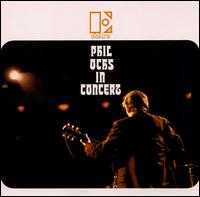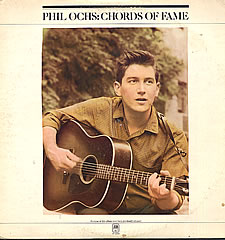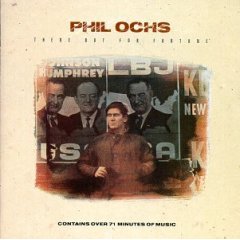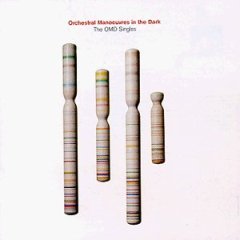
Philip David Ochs was an American protest singer and songwriter who was known for his political activism, often alliterative lyrics and distinctive voice. He wrote hundreds of songs in the 1960s and 1970s and released eight albums.

All the News That's Fit to Sing was Phil Ochs's first official album. Recorded in 1964 for Elektra Records, it was full of many elements that would come back throughout his career. It was the album that defined his "singing journalist" phase, strewn with songs whose roots were allegedly pulled from Newsweek magazine. It is one in a long line of folk albums used to tell stories about everyday struggles and hardships.

Phil Ochs in Concert is Phil Ochs' third long player, released in 1966 on Elektra Records. Despite its title, it was not entirely live, as several tracks were actually recorded in the studio, owing to flaws in the live recordings made in Boston and New York City in late 1965 and early 66. The album's producers retained the essence of a live album by including song patter and audience reactions between and during the songs. Phil Ochs in Concert features many of the folksinger's most enduring songs and represents the culmination of Ochs' folk career, the last of his original albums to be all-acoustic.

Chords Of Fame was a 2-LP compilation of folksinger Phil Ochs' career, compiled by his brother shortly after Ochs' death in 1976. Released on A&M Records, it compiled tracks Ochs had recorded for both that label and Elektra Records. The compilation included several rarities:

Sings For Broadside, alternatively known as Broadside Ballads, Vol. 10, was a 1976 compilation of songs that Phil Ochs had recorded for Broadside Magazine as demonstration recordings or at benefit shows for them. Initially, Ochs had hoped for the magazine to release one single concert, but when the material he presented to them came up far too short for a full LP and not featuring several of his best and well-known numbers, he suggested they splice on whatever they desired. The result was this album, which featured tracks recorded between about 1965 and about 1973.

Live at Newport is a 1996 compilation on Vanguard Records of folk singer Phil Ochs' three appearances at the Newport Folk Festival, in 1963, 1964 and 1966. Presenting twelve tracks that also appear on his first, second, third, fourth and fifth albums, Ochs is at his peak as a folk singer throughout, singing anti-war songs alongside those espousing civil rights and worker's rights, and showcasing some more introspective numbers that would be dramatically rearranged on the fourth and fifth albums.

A Toast to Those Who Are Gone is a 1986 compilation album of recordings that Phil Ochs made in the early to mid-1960s, mostly between his contracts with Elektra Records and A&M Records. In line with recordings made on the former, Ochs espouses his left-leaning views on civil rights on songs like "Ballad of Oxford", "Going Down To Mississippi" and "Colored Town", his views on worker's rights on "No Christmas in Kentucky", his attack on the American Medical Association on "A.M.A. Song", and the unwilling hero on the title track.

There but for Fortune was a 1989 compilation that summed up the three albums that Phil Ochs recorded for Elektra Records between 1964 and 1966. The album drew heavily from the third, presenting ten of its eleven tracks, and presenting six and five respectively from the first and second.

Joan Baez/5 is a 1964 album by American folk singer Joan Baez. It peaked at number 12 on the Billboard 200 chart. The single "There But for Fortune" reached number 50 on the Billboard Hot 100 in the U.S. and became a top-ten single in the U.K.

The First Ten Years is a 1970 Joan Baez compilation album, which rounds up highlights of her first decade with the Vanguard label.

The OMD Singles is a singles compilation album by Orchestral Manoeuvres in the Dark, released in 1998. It reached No. 16 in the UK charts. Originally, the compilation was to include a second disc of new remixes; however, this idea was abandoned due to budget limitations. The few remixes that were produced were released separately as The OMD Remixes. In 2003, The OMD Singles was reissued in France with the remix disc finally included, comprising the 1998 remixes as well as additional remixes. In the same year Virgin also released a two-disc box set comprising The OMD Singles and Navigation: The OMD B-Sides.

Jack Landrón is an Afro-Puerto Rican folksinger, songwriter, and actor.
Jim and Jean, composed of Jim Glover and Jean Ray (1941–2007) were an American folk music duo, who performed and recorded music from the early to the late 1960s.
Jim R. Glover is an American peace activist and folk singer. He is from Cleveland, Ohio and lives in Brandon, Florida.
"Who Killed Davey Moore" is a topical song written in 1963 by American folk singer/songwriter Bob Dylan. Though the song was not commercially released on Dylan's several studio albums in the 1960s, it was popular in his repertoire for live shows during that era. Dylan's performance of the song at Carnegie Hall on October 26, 1963, would later be released on The Bootleg Series Volumes 1–3 1961–1991 in 1991, and an October 1964 performance is on The Bootleg Series Vol. 6: Bob Dylan Live 1964, Concert at Philharmonic Hall, released in 2004.

What's That I Hear?: The Songs of Phil Ochs is a 1998 tribute compilation to the music of the late Phil Ochs. The various performers cover several generations of Ochs' admirers. All profits from the album's sales were divided equally between the non-profits, the ACLU Foundation of Southern California and Sing Out! Magazine.
"There but for Fortune" is a song by American folk musician Phil Ochs. Ochs wrote the song in 1963 and recorded it twice, for New Folks Volume 2 and Phil Ochs in Concert. Joan Baez also recorded "There but for Fortune" in 1964, and her version of the song became a chart hit.

The discography of Phil Ochs, a U.S. protest singer and songwriter, consists of seven studio albums, six live albums, six compilation albums, one box set, six other albums, and nine singles.

On My Way is a 2010 album of previously unreleased Phil Ochs performances, originally recorded in 1963 by Roy Connors of The Highwaymen.
"Here's to the State of Mississippi" is a civil rights protest song by Phil Ochs, an American topical singer and songwriter in the 1960s. Ochs is best known for his anti-war and freedom songs. "Here's to the State of Mississippi" was released in 1965 as the last track on his album I Ain't Marching Anymore. The song criticizes the state of Mississippi for its mistreatment of African Americans. He points out various problems with the social constructs that allowed for oppression of the race. Jim Crow laws and white supremacy in the South fueled an imbalance in the civil structure of the state. "Here's to the State of Mississippi" touches on various issues like segregation, corrupt and biased school systems, and the negligence and crookedness of society and of government officials.














